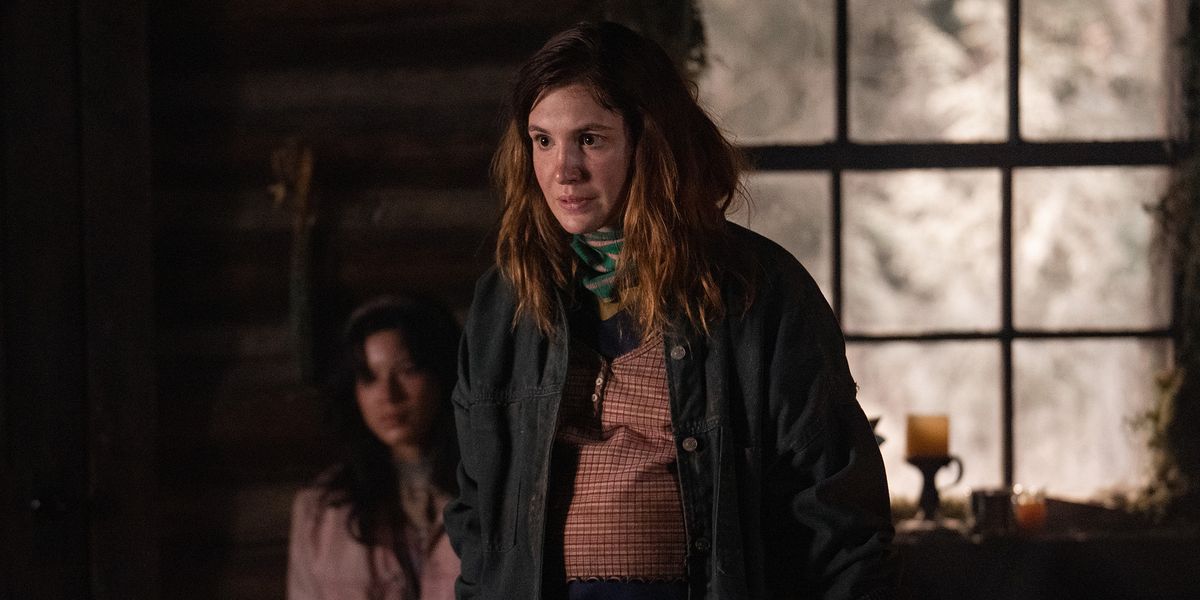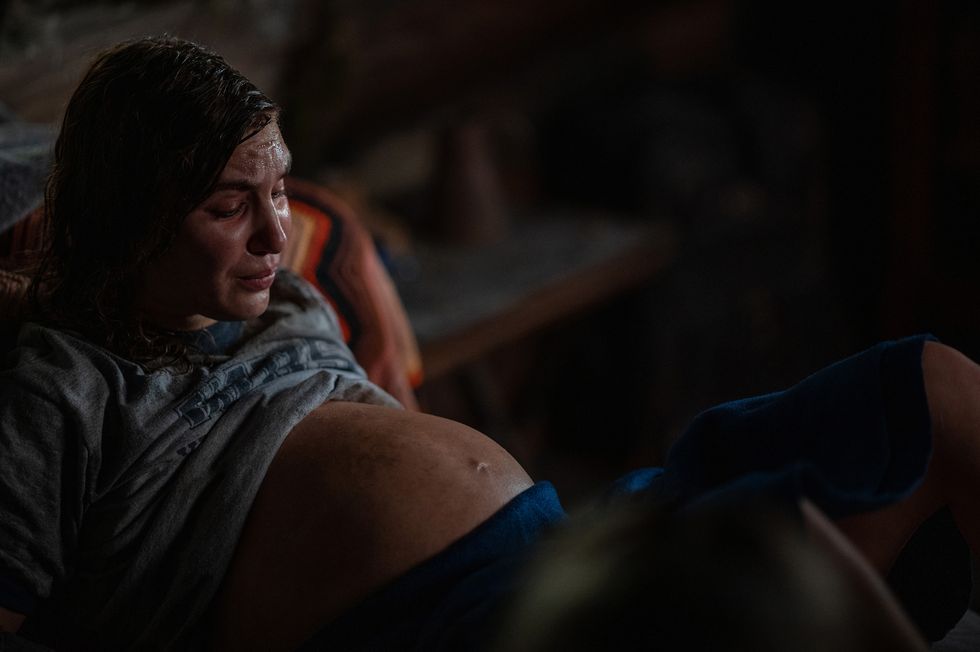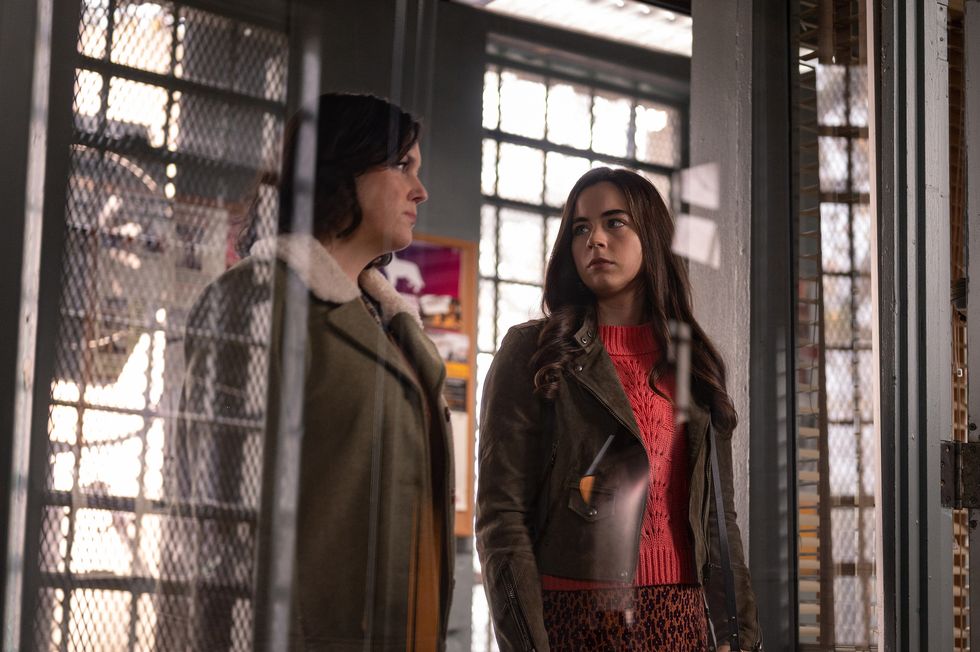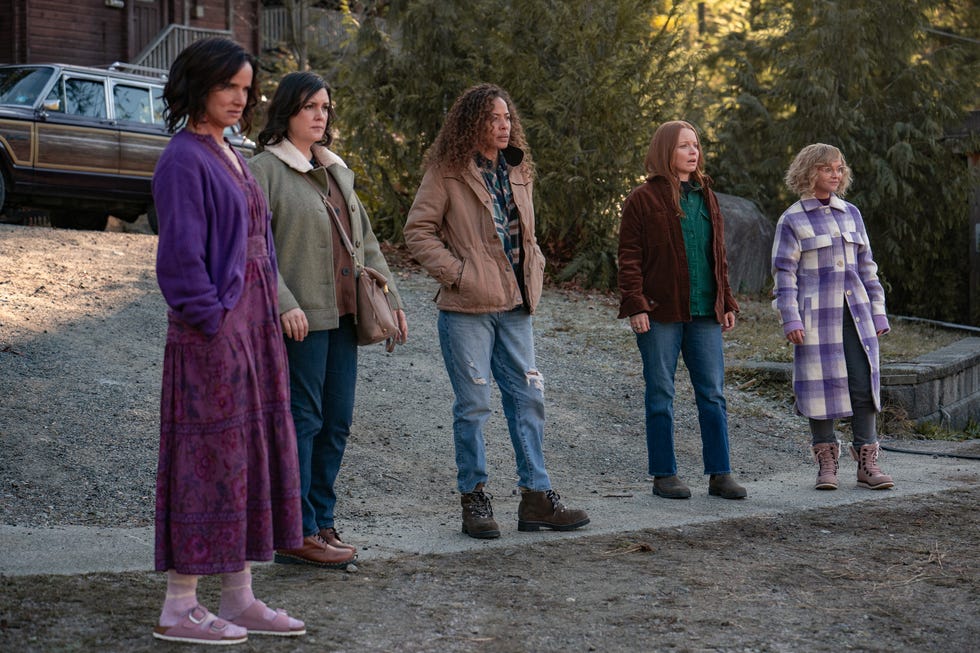Shauna’s Birth and Baby Hallucination Explained
Spoilers ahead
One of the lingering questions in the heads of Yellowjackets fans is, “What happens to Shauna’s baby?” In season 1, teen Shauna (Sophie Nélisse) was revealed to be pregnant by Jeff, her best friend Jackie’s boyfriend, causing a rift between the two girls that ended in fatal fashion when Jackie froze to death after one of their fights. As time progressed on the Showtime series, Shauna inched closer towards labor despite the lack of food and nutrients available in the wilderness.
In “Qui,” the sixth episode of the second season, Shauna finally goes into labor and gives birth to a baby boy. But despite Shauna’s desperation—which manifests in a long hallucination of her struggles to get the baby to breastfeed, a showdown with Lottie who has formed an odd attachment to Shauna’s unborn child, and a horrifying discovery of her teammates feasting on her son’s body—the baby doesn’t survive the delivery. In the present-day, Shauna’s (Melanie Lynskey) identity as a mother is tested when she and her teenage daughter Callie are called into the police station to be questioned further about Adam’s disappearance, and she ultimately admits to the affair.
Showrunner and executive producer Jonathan Lisco chatted with ELLE.com about Shauna’s big episode, whether the creative team pays attention to fan theories, and what to expect in the season’s remaining three episodes.
How early in the process did the creative team know that Shauna’s baby wouldn’t survive?
Pretty early. We’re a writer’s room that always kicks the tires in multiple directions at the same time. We say that any idea is a good idea at the beginning stages. If you went back and looked at our crazy idea boards, I’m sure we had many ideas for what could happen but ultimately, pretty early in season 2, we decided that having Shauna give birth in the wilderness and having to then sustain storylines around that baby could kind of suck the air out of the room in a way because we’d always have to ask ourselves, Where’s the baby? Who’s with the baby? What’s going on with the baby?
But that was not the major consideration; the major consideration was asking what was the most devastating and interesting story to tell for her, and how would the story that we tell for Shauna in the wilderness inform the story that we’re telling in the present day in terms of the trauma that she went through. The mechanics of how we told that story in the most poignant, heart-wrenching, and meaningful way was a work in progress throughout season 2.
It’s hard to look at a dead body on Yellowjackets and not expect the worst. So can we expect that Shauna’s dream comes true and the dead baby will be the next body the group feasts on?
We certainly appreciate that the audience could see that as a conceivable direction for the story to take. And I say that not because we want the audience to be so terribly haunted by it all, but because they’re in the wilderness and they’re starving to death and arguably kind of losing their minds in their own unique ways. I happen to have written episode two and everybody was calling [the cannibalism] an immoral act, but one of the things I often say is: if you’re starving in the wilderness and there’s already a corpse there and your only means of survival is to consume that person… Yes, it’s breaking a taboo, but is it immoral? I would wonder if it is.
I think immorality comes from doing transgressive things when faced with a good and bad decision, but this is basically taboo breaking—it’s the veil of civilization coming down. Does it change if you eat a full grown human versus a tiny human? I think that there are good arguments on both sides. I appreciate that the audience thinks that that is the direction that it could take, but on a practical level—and I hate to be gross—eating a tiny newborn isn’t exactly going to get them through the winter.
Were there any fan theories that made you reconsider his fate?
It’s funny, the fans said really interesting things. Some fans said, “If they’re going to eat the baby, I’m out.” Other fans said, “Oh, they might eat the baby!” and were almost enthusiastic about it. There was a crazy polarity in terms of audience response. There are no hard and fast rules for what we will or will not do on the show—we’re open to everything. It’s not as if we’re trying to be sensational for sensationalism’s sake; we’re not trying to be overly graphic. If we thought that, God forbid, the eating of a baby made good sense in the storyline, we might have entertained it. On the other hand, to have a new life come into their lives in the wilderness and then to immediately see it as a food source was a very intense direction to go in, so we had to be very careful about that one. But again, that wasn’t really the informing principle. The informing principle was what’s the most interesting story to tell for Shauna because she is our main character.
Of course we read all those fan theories about the baby and we took them into consideration, but ultimately we have to stick to our own instincts and tell a story that we think would be the most evocative and wrenching, and we hope we did it in a really surprising way. It wasn’t just a straight ahead story of a baby being born and then dying.
I loved some of the touches that were included to hint that Shauna was hallucinating that her child was alive, like the fact that the baby’s crying initially sounded robotic. What did the creative team talk about in terms of Shauna’s dream about her son? Were there any other touches audiences might have missed?
That was absolutely purposeful. Ideas come from all different areas on our team, including our wonderful editors. They flexed the sound design to subliminally give you that idea. I would also say when, for example, Natalie comes in and sees that the baby is finally suckling, she gives Shauna a look that is not exactly in the ballpark of a look you would give your friend if something lovely and beautiful like that has just happened. It’s almost a look of disappointment and there’s something very eerie about it. Equally, when she sits down with a cup of tea, the camera sort of slides over to it and you’re asking on a very unconscious level, what’s going on here? What’s happening, why is this not playing the way I thought it would play? We absolutely do pepper in those touches, but we are always mindful of not being too overt or explicit with them, because part of the deliciousness of the episode is not to tip it.
Shauna’s biggest fear in her dream is that her son will be taken away from her, and in the present, Shauna admits that she never wanted to be a mom and doesn’t love Callie. It feels opposite to her during her wilderness pregnancy and her unconscious post-mortem hallucination with her son. What conversations did the writer’s room have about Shauna’s identity as a mother and how this trauma likely affected her future?
I have a slightly different interpretation. I think you’re absolutely correct that in the wilderness storyline, her biggest fear was losing the baby and having it taken away or co-opted by forces beyond her control. But the fact that she wants the baby in the wilderness actually has a lot to do with her interactions with Callie in the present day. I would dispute one small thing in what you said, which is that she doesn’t love Callie. I actually believe she loves Callie hopelessly and relentlessly, but she’s never allowed herself to fully love her for fear that she could lose her again, the same way she lost the baby in the wilderness. To us, that’s actually quite poignant—the reason why Shauna is unable to fully embrace her maternal love for Callie in the present day harkens back to the loss of that baby in the wilderness. It’s not that it’s caused her to be unloving in the present day. It’s that her fear of repeating that trauma and going through it again is the driving force of her actions.
Like a coping mechanism.
Exactly. In episode 7, you’ll hear her articulate something along those lines to Lottie.
Shauna was the one that opened the gates to cannibalism when she gave the green light to eat Jackie. Now in this episode, that’s what haunts her in her dream when she thinks the team is eating her son. Is that a comment on Shauna’s need for power and control?
That’s a very good question. I think in some ways, it has more to do with her guilt. Let’s not forget that this baby was brought into the world because of the relationship that she had with her best friend’s boyfriend, who she’s currently married to in the present day, and that best friend is the same one that she consumed. And not just consumed, but gave the assent to the entire group to consume her. So I think if anybody’s being consumed, it’s Shauna at the moment by her intense guilt. Later in the season, however, I think you will see some power dynamics emanating from Shauna. And there [are] some things coming where Shauna will feel stung by what some of the other girls do because she’ll feel that she deserves the power and not someone else. But in this instance, I think it’s more about unrelenting guilt and self-recrimination.
Earlier in the season, Lottie drew the mysterious symbol on the baby’s blanket and when blood fell on it almost like an offering, it was met with a flock of dead birds. Now we find out that the baby didn’t survive the delivery. Can you tell us anything about the symbol and its powers as it relates to life and death?
I can’t be too explicit about it because it’s something that we’re still going to dramatize in the course of the show. But one thing that’s really interesting is how we start to invest meaning into these symbols, and you could extrapolate that out into all sorts of symbols—religious and otherwise—in our current culture and in real life. Are they symbols that convey some kind of dread about past or future events, or are they a protective talisman that in some way gives people comfort to have them close? That’s the question we’re exploring along with the more provocative question: can they be both? And if they can’t be, can they be both at least subjectively, depending on which character is perceiving them at any given time? Does the symbol itself have power or does it only have power as it is interpreted by a specific girl in the wilderness or woman in the present day? The symbol is certainly an evocative thing but for us, it’s all about people’s point of view on the symbol. The symbol itself might be potent, but it’s really about how they interpret it that will inform the story moving forward.
In the present day, Shauna admits to the police about having an affair with Adam after spending most of the season denying even knowing him. Usually Shauna is really buttoned up with her lies. What went into the decision of having her slip up?
I actually think she made a calculated decision. People can have a very different interpretation, but my interpretation is that it was a cross-pollination of sincerity and strategy for Shauna. Now that she’s been cornered in an interrogation room, she had to say the truth because she felt like the truth (or a version of the truth without the whole truth, obviously) would be a better deflective mechanism that could be more self-preservational than continuing to lie. I think she knew that they had good theories about her relationship to Adam, so ultimately admitting that she was a bored housewife, so to speak, who had an affair with an artist to spice things up seems like a plausible admission without going so far as to say “I stabbed him in the chest during an episode of PTSD.” I think she’s thinking strategically and emotionally, but I do think the strategy there may be weak.
Lottie and Shauna are at odds with each other in the wilderness, and it seems like all of the women—not just Shauna—lost touch with Lottie after their rescue since she was institutionalized. What made Shauna go to her community at the end of the episode?
Jeff says, “you need to go because you’re just making this worse,” and I think there’s two things going on: the conscious her is thinking I probably should get out of dodge because the more I hear, the more I could potentially get into hot water should they continue to ask questions. At the very least I’ll get myself a little distance and time to think and strategize about things. But the subconscious part of her is being drawn back to the women. These adult women share something that no one else shared, which is a mutual or collective understanding of what they went through. When you go through something like that, who could possibly understand that except those who are there with you? So when she hears that Tai and Van are actually heading up there and then Jeff gives her the idea that she should go too, I think she’s ineluctably drawn to join that group of women, both because she’s curious but also there’s this weird alchemic magnetism that’s coming from them. It’s kind of a confluence of all those factors.
What can you tell us about the rest of the season?
People said, “oh my gosh, they’ve crossed the Rubicon. They’ve now eaten Jackie, they’ve really gone down the rabbit hole of immorality.” In the last three episodes, their moral choices get much grayer—meaning not as black and white—and then we’re really going to explore hard choices. Then we’re really going to be able to say oh, this person made an immoral choice, or this person made a choice that I don’t agree with. The last three episodes really are going to hook our audience and continue to live inside their consciousness. It’s going to be us complicating the girls’ choices in the wilderness and making what they do even more provocative.
This interview has been edited and condensed for clarity.
Radhika Menon is a freelance entertainment writer, with a focus on TV and film. Her writing can be found on Vulture, Teen Vogue, Bustle, and more.
Check out our Latest News and Follow us at Facebook
Original Source




